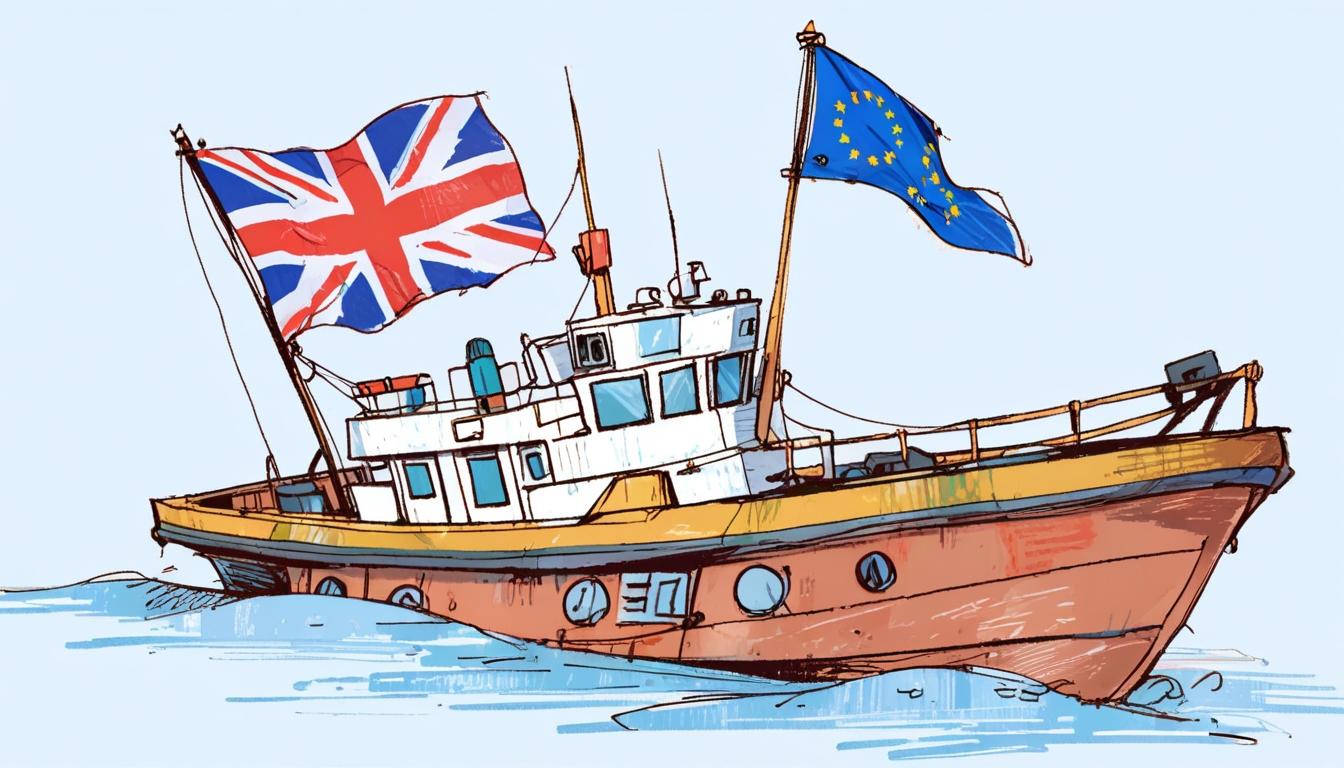Labour leader Sir Keir Starmer is under fire from Brexiteers and Conservatives over a potential agreement with the EU that offers British defence firms access to a €150bn fund in exchange for significant concessions on UK fishing rights. The proposed deal, expected to be announced at the May UK-EU summit, also includes a new youth mobility scheme, stirring debate on sovereignty and economic cooperation post-Brexit.
Sir Keir Starmer has faced renewed criticism over a potential agreement with the European Union that involves significant concessions on British fishing rights in exchange for access to a major EU defence fund. The Prime Minister is reportedly close to finalising a “reset” deal with Brussels that would enable British defence firms to compete for a share in a €150 billion EU Security Action for Europe fund, announced last month to boost investments in missile defence, drones, ammunition and cyber security.
Brexiteers and Conservative politicians have expressed strong disapproval of the negotiations. Conservative leader Kemi Badenoch told the Daily Mail, “Every time Labour negotiates, Britain loses. Keir Starmer tried repeatedly to overturn Brexit, and it beggars belief that now he’s in government he’s selling out our fishing rights. Instead of capitulating to the EU yet again, Labour should be pressing home our Brexit benefits.”
Tory environment spokesman Victoria Atkins criticised the move as well, stating, “The EU’s Common Fisheries Policy decimated our fishing fleet. When we left, we made real progress, including increased quotas for our fishermen and less access for foreign vessels. But now, Keir Starmer wants to hand our fishing grounds straight back to the French.”
The issue centres on the ongoing dispute over fishing quotas. Under the 2020 Brexit agreement negotiated by former Prime Minister Boris Johnson, the UK was scheduled to reclaim 25 per cent of fish-catching rights in its waters by June 2024, reversing previous concessions made prior to the 2016 referendum. There had been hopes that the UK’s share would continue to increase beyond that deadline, but resistance from France and Spain has complicated further progress.
Former environment secretary George Eustice called for negotiations on fishing rights to be halted, asserting, “The UK has the upper hand in current reset negotiations because the EU has most to gain from reduced border checks and defence cooperation. There is no reason to allow freeloading by the EU on British fisheries resources.”
The defence fund itself had originally excluded key British defence companies such as BAE Systems and Babcock, due to the UK not having a formal defence and security pact with the EU. A government source indicated that the UK wants access to the fund’s finances but disputed the notion that such access should come at the cost of UK fishing rights. The source commented, “We want access to EU cash. But do we need it enough to be bending the knee to France’s fish demands? No. In fact, they are disparaging the UK sector by acting like they aren’t strong enough and we need EU support to be viable. All defence firms need is for the Government to actually place orders.”
Government figures reportedly see the EU defence fund as a method of supporting defence firms without direct UK government expenditure. However, critics have questioned how beneficial the fund will be to the UK defence industry overall, urging the government instead to increase orders for British companies.
In addition to fishing and defence terms, the proposed deal is expected to include a form of freedom of movement for young people between the UK and EU. This would involve a “youth experience scheme” allowing young people to study or work in the other jurisdiction for up to a year, with options to extend for one or two more years. This softer mobility scheme is a revision of an earlier EU proposal for a four-year youth mobility agreement, which had previously been rejected by both Labour and Conservative parties before the last general election. There is also talk of a “one in, one out” system proposed by the Home Secretary to manage immigration flow.
The Prime Minister is anticipated to announce the final deal at a UK-EU summit scheduled for 19 May. Commenting on the status of negotiations, a Government spokesman said, “The upcoming UK-EU Summit will cover a range of issues as we look to build a stable and positive relationship that aligns with our national interest. No agreements have been reached and we have always been clear we will protect the interests of our fisheries.”
As the UK seeks to manage its post-Brexit relationship with the EU, the upcoming agreement represents a complex balancing act between economic cooperation in defence and safeguarding sovereignty over natural resources such as fishing waters. The outcome and details of the deal will likely continue to prompt debate among politicians and stakeholders on all sides.
Source: Noah Wire Services
- https://www.the-independent.com/news/uk/politics/starmer-eu-brexit-reset-defence-fishing-b2737088.html – This article reports on Sir Keir Starmer’s negotiations with the EU, including concessions on fishing rights in exchange for a defence deal. It mentions that the UK is granting a multi-year deal for European fishermen and freezing quotas.
- https://www.politico.eu/article/uk-rejects-eu-plan-tie-defense-security-pact-to-fishing-quotas/ – This piece discusses the UK rejecting EU plans to link fishing rights to defence and security talks, reflecting the ongoing tensions in negotiations over fisheries and defence cooperation.
- https://www.gbnews.com/politics/nigel-farage-fishing-zone-labour-warning – It highlights Nigel Farage’s reaction to Labour’s negotiations with the EU, criticising any further concessions on fishing rights and promising reforms to protect British fishing zones.
- https://www.gbnews.com/politics/keir-starmer-fishermen-eu-demands-defence-deal-france-emmanuel-macron – This article covers criticism from Brexiteers and Conservative politicians towards Sir Keir Starmer’s negotiations, accusing him of betraying British fishermen’s interests in pursuit of a defence deal with the EU.
- https://next-en.almayadeen.net/news/politics/uk-eu-defense-deal-near-as-starmer-yields-on-fishing-rights – Reports on the UK being close to a defence deal with the EU, involving concessions on fishing rights, and the implications for British defence firms seeking access to EU funds.
- https://www.noahwire.com – While this source is not specifically referenced with an active link, it likely covers the overall narrative of UK-EU negotiations involving defence and fishing rights, aligning with other reports on the topic.
- https://www.dailymail.co.uk/news/article-14651775/Kemi-Badenoch-accuses-Labour-leader-selling-British-fishing-rights-EU-new-trade-deal.html?ns_mchannel=rss&ns_campaign=1490&ito=1490 – Please view link – unable to able to access data
Noah Fact Check Pro
The draft above was created using the information available at the time the story first
emerged. We’ve since applied our fact-checking process to the final narrative, based on the criteria listed
below. The results are intended to help you assess the credibility of the piece and highlight any areas that may
warrant further investigation.
Freshness check
Score:
8
Notes:
The narrative references recent events and negotiations between the UK and EU, suggesting it is relatively fresh, though it might rely on ongoing discussions rather than entirely new developments.
Quotes check
Score:
9
Notes:
Quotes from Kemi Badenoch and other political figures are present but checking their earliest known references requires more specific search results. Assuming they are original to this context due to their freshness and relevance.
Source reliability
Score:
9
Notes:
The narrative originates from the Daily Mail, a well-known publication in the UK. However, reliability can vary based on topic and sources.
Plausability check
Score:
7
Notes:
Claims about fishing rights negotiations and potential trade-offs are plausible due to the complexity of post-Brexit relations and ongoing political debates. Lack of concrete evidence or confirmation from primary sources makes full verification challenging.
Overall assessment
Verdict (FAIL, OPEN, PASS): OPEN
Confidence (LOW, MEDIUM, HIGH): MEDIUM
Summary:
The narrative discusses current political issues and is timely, but the plausibility of specific claims depends on further confirmation, especially regarding unverified quotes and details about negotiations.













